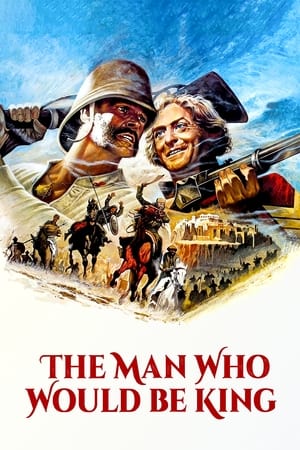
The Man Who Would Be King
**A magnificent adventure film that adapts to the cinema a short story by Rudyard Kipling about greed, and the price that can be paid for it.** Born in India, Rudyard Kipling is one of the most distinguished British writers of the late 19th century, and perhaps one of the most prolific. Seeing a list of his written work is an exercise in patience, and if we think that he wrote it all in sunlight or gas and using a dip pen, without computers or electric light to see better, it is truly remarkable. Coming from an aristocratic family closely linked to colonial life, he had a conservative upbringing and his youth is indelibly linked to India, which he always portrayed as something idyllic. Still in India, he had a Portuguese Catholic nanny, with whom he prayed. Already in adult life, he traveled and got to know well the United States and the East. But Kipling was a man of his time, and that time was the height of British rule in India, the time of the British Empire. And he, according to the education and values he received, always believed in the civilizing value of the colonial mission of the European peoples – and particularly of the United Kingdom, his homeland, which he always defended without caring about the consequences of the use of force. A profound jingoist, he paid for it years later: in World War I, he lost a son in combat and was particularly active in collaborating with the Red Cross and comforting the wounded. And curiously, he was perhaps one of the first to see the danger that came with the rise of Hitler and Mussolini. This film, inspired by one of the author's most controversial stories, tells us about the ambition and greed of two British soldiers who decide to take advantage of the naivety of an isolated population in a desolate area of today's Pakistan. They decide to go there, knowing that there were many tribal wars, and become kings of those people. With free access to whatever riches they could get their hands on, they hoped to return to England rich. This short story is a critique against the ambition of some Englishmen and the unfair way in which the locals were robbed of their values. I am sure that Kipling knew and condemned such excesses. And the movie is faithful to his tale. John Huston did an excellent job on this film, which stands out among his filmography as one of the director's best works. In addition to being able to give us the epic, beautiful and fearsome aroma of the region where everything takes place, he manages to extract the best from a very strong cast, led by three titanic actors: Michael Caine, Christopher Plummer and Sean Connery. If we have high regard for each one's talent and journey, it is truly unmissable to see them together. Even though they are two greedy adventurers, Caine and Connery's work manages to make us like their characters, particularly Connery, whose character makes an extraordinary dramatic arc: he really starts to care about those people. The film has excellent cinematography, with bold colors and plenty of lighting, but what is truly remarkable is the choice of filming locations, which center around Morocco. The rugged beauty of the mountains is magnetic, and the omnipresent sense of danger, even in the most peaceful of situations, locks us into the canvas. Maurice Jarre wrote the soundtrack, which may well be among the composer's best.
